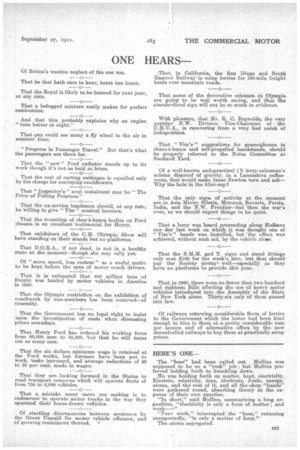ONE HEARS
Page 3

If you've noticed an error in this article please click here to report it so we can fix it.
Of Briton's wanton neglect of the one ton.
That he that hath ears to hear, hears one hears.
That the Royal is likely to be banned for next year, at any rate.
That a befogged mixture really makes for perfect combustion.
And that this probably explains why an engine "runs better at night."
That one could see many a fly wheel in the air in summer time.
"Progress in Passenger Travel." But that's what the passengers are there for.
That the "new" Ford radiator stands up to its work though it's not as bold as brass.
That the cost of carting cabbages is equalled only by the charge for conveying cauliflowers.
That " Inspector's " next instalment may be "The Price of Pulling Potatoes."
That the ex-service bandsmen should, at any rate, be willing to give " Vim " musical honours.
That the mounting of char-iebancs bodies on Ford chassisV is an excellent testimonial for Henry.
That exhibitors of the C.M. Olympia Show will have standing on their stands but no. platforms.
That D.O.R,A., if not dead, is not in a healthy state at the moment—though. she may rally yet.
Of "more speed, less custom" as a useful motto to be kept before the eyes of motor coach drivers.
—0 That it is estimated that 480 niilLon tons of freight was hauled by motor vehicles in America in 1920.
That the Olympia restriction on the exhibition of coachwork by non-members has been removed—of necessity.
That the Government has no legal right to insist upon tire investigation of costs when discussing prices nowadays.
That Henry Ford has reduced his working force from 60,000 men to 45,000, hut that he still turns out as many cam.
That the six dollars minimum wage is retained at the Ford works, but foremen have been put to work, tasks increased, and average reductions of 20 i to 25 per cent. made n wages.
That they are leaking forward in the States to road transport concerns which will operate fleets of from 750 to 2,000 vehicles.
That a mistake many users are making is to endeavour to operate motor trucks in the way they operated their horse-drawn vehicles.
— -0 Of startling discrepancies between sentences by the Great 'Unpaid for motor vehicle offences, and of growing resentment thereat. • -That, in California,. the San Diego and South Eastern Railway is using lorries for 100-mile freight hauls over mountain road& That eome of the decorative schemes at Olympia are going to be well worth seeing, and that the etandardized sign will not be so much in evidence.
With pleasure, that Mr. R. C. Reynolds, the very popular N.W. Division Vice-Chairman of the C.M.U.A., is recovering from a very bad patch of indisposition.
That " Vim's " euggestions for gramophones in chars-à-banes and self-propelled bandstands, should be properly referred to the Noise Committee at Scotland Yard.
Of a well-known andepractical ( I) lorry-salesman's solemn disproof of gravity, in a Lancashire .00ffeereom, that would make Isaac Newton turn and ask— Why the hole in the filler-cap 7 That the only signs of activity at the moment are in Asia Minor, Silesia, Morocco, Bavaria., Persia, India, and the N.W. Frontier—but then the war's over, so we should expect things to be quiet.
That a. lorry was heard proceeding along .Holborn one day last week on which it was thought one of "Vim's" bands was -installed, but 'the effect was achieved, without such aid, by the vehicle aloe.
That the S.M.M. and T. signs and stand fittings only cost £100 for the week's hire, but that should pay the Society 'pretty l well—especially as they have no platforms to provide this year.
That, in 1920, there were no fewer than two hundred and eighteen Bills affecting the use of heavy motor vehicles introduced into the Assembly of the State of New York alone. Thirty-six only of them passed into law.
Of railways returning considerable fleets of lorries to the Government which the latter had been kind enough to hire to them at apretty considerable sum per annum and of alternative offers by the now decontrolled railways to buy them at practically scrap prices.


































